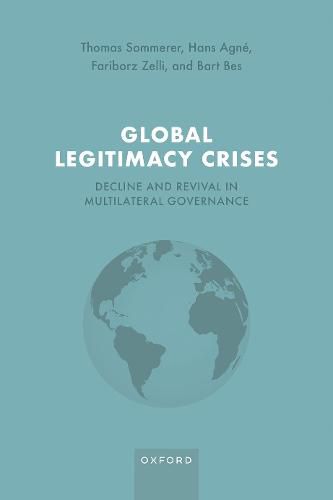Readings Newsletter
Become a Readings Member to make your shopping experience even easier.
Sign in or sign up for free!
You’re not far away from qualifying for FREE standard shipping within Australia
You’ve qualified for FREE standard shipping within Australia
The cart is loading…






This is an open access title available under the terms of a CC BY-NC-ND 4.0 International licence. It is free to read at Oxford Scholarship Online and offered as a free PDF download from OUP and selected open access locations.
Global Legitimacy Crises addresses the consequences of legitimacy in global governance, in particular asking: when and how do legitimacy crises affect international organizations and their capacity to rule. The book starts with a new conceptualization of legitimacy crisis that looks at public challenges from a variety of actors. Based on this conceptualization, it applies a mixed-methods approach to identify and examine legitimacy crises, starting with a quantitative analysis of mass media data on challenges of a sample of 32 IOs. It shows that some, but not all organizations have experienced legitimacy crises, spread over several decades from 1985 to 2020. Following this, the book presents a qualitative study to further examine legitimacy crises of two selected case studies: the WTO and the UNFCCC. Whereas earlier research assumed that legitimacy crises have negative consequences, the book introduces a theoretical framework that privileges the activation inherent in a legitimacy crisis. It holds that this activation may not only harm an IO, but could also strengthen it, in terms of its material, institutional, and decision-making capacity. The following statistical analysis shows that whether a crisis has predominantly negative or positive effects depends on a variety of factors. These include the specific audience whose challenges define a certain crisis, and several institutional properties of the targeted organization. The ensuing in-depth analysis of the WTO and the UNFCCC further reveals how legitimacy crises and both positive and negative consequences are interlinked, and that effects of crises are sometimes even visible beyond the organizational borders.
$9.00 standard shipping within Australia
FREE standard shipping within Australia for orders over $100.00
Express & International shipping calculated at checkout
This is an open access title available under the terms of a CC BY-NC-ND 4.0 International licence. It is free to read at Oxford Scholarship Online and offered as a free PDF download from OUP and selected open access locations.
Global Legitimacy Crises addresses the consequences of legitimacy in global governance, in particular asking: when and how do legitimacy crises affect international organizations and their capacity to rule. The book starts with a new conceptualization of legitimacy crisis that looks at public challenges from a variety of actors. Based on this conceptualization, it applies a mixed-methods approach to identify and examine legitimacy crises, starting with a quantitative analysis of mass media data on challenges of a sample of 32 IOs. It shows that some, but not all organizations have experienced legitimacy crises, spread over several decades from 1985 to 2020. Following this, the book presents a qualitative study to further examine legitimacy crises of two selected case studies: the WTO and the UNFCCC. Whereas earlier research assumed that legitimacy crises have negative consequences, the book introduces a theoretical framework that privileges the activation inherent in a legitimacy crisis. It holds that this activation may not only harm an IO, but could also strengthen it, in terms of its material, institutional, and decision-making capacity. The following statistical analysis shows that whether a crisis has predominantly negative or positive effects depends on a variety of factors. These include the specific audience whose challenges define a certain crisis, and several institutional properties of the targeted organization. The ensuing in-depth analysis of the WTO and the UNFCCC further reveals how legitimacy crises and both positive and negative consequences are interlinked, and that effects of crises are sometimes even visible beyond the organizational borders.